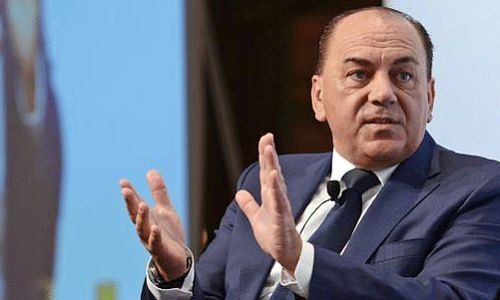When UBS Chairman Axel Weber was asked to analyse the future of global banks, he didn't intend to talk about his own institute. Faced with an audience, he couldn't hold back entirely and showed pride presenting the progress UBS in recent years.
«At this 20th Handelsblatt-Conference «Banks in Transition», we've gathered intelligent people galore, but nobody tells us about the shape of things to come.» This was the introduction by «Handelsblatt»-Publisher Gabor Steingart, asking UBS Chairman Axel Weber to speak to an audience of bankers and further experts from the finance industry last week in Frankfurt.
Axel Weber gave them shape and direction. Competent, poised, convinced - and convincing. Peppered with facts and opinions, about UBS, about banking regulations, the situation in the European Union, dramatic as he judges it to be, and not least about the current unorthodox monetary policy, which makes the credit channel unviable for commercial banks.
«Sober Yet Ruthless Analysis»
«Perspectives and strategies for global banks,» was his topic, with 2030 acting as horizon. For Weber, this wasn't quite enough: «The year 2050 does play a role in my speech,» he said, signaling just how far-sighted his guidance of Switzerland's biggest bank is - and leaving his fellow speakers way behind.
«Ahead of every strategic discussion, you need a sober yet ruthless analysis of the starting position,» said Weber. There was no room for doubt in the conference hall that UBS has already moved beyond this analysis, quite unlike many other large institutes.
Current Challenges Are Similar in Switzerland, Germany and the US
The year 2030 is asking for the next strategic decision, said Weber. «Strategies 2020, that's five years, a phase of adjustment, which is largely given through regulations, the development of the market and customer behaviour.»
The current challenges facing UBS aren't too different from the ones banks in Germany, the UK or the US are grappling with, Weber said. We talking about the regulatory environment on the one hand and macroeconomic conditions on the other, in particular interest rate levels.
Central Banks as Decisive Factors
Central banks have become decisive factors. The development appeared attractive to many, because investment advice wasn't particularly difficult at the moment, with some investment vehicles so unattractive they could be left out of the equation, Weber said, doubting that this would prove sustainable in the long run.
The low-rate environment is a challenge for banks, insurers and pension funds, and bank customers have changed since the financial crisis. They took big losses. The damage to their trust in banks was substantial, Weber said, affecting their share prices and capitalization.
Room for Higher Dividends
Many banks had made big steps forward in recent years, Weber said. He underlined how far UBS had come in increasing the banks capitalization relative to its competitors. The capital ratio has risen from 6.7 percent in 2012, before UBS was restructured, to more than 14 percent according to Basel III standards.
This allowed for more generous dividends. The dividend has risen to 50 centimes from 5 centimes at the time when Weber joined the bank, with the promise of an extra dividend of 25 centimes.
The change of business model undergone was clearly appreciated by the market, UBS Chairman Weber estimates. When Sergio Ermotti and Weber took the reigns at the end of 2011, beginning of 2012, the share of UBS was worth less than 10 francs. Since, it more than doubled to 22 francs, before the most recent decline.
Strategic Decisions Paid Off
UBS was less affected by falling stock market prices than its competitors, Weber said, drawing yet another favorable comparison. UBS is still 20 percent more expensive than at the start of 2015, with some competitors barely able to avoid a decline in their valuation. «It has paid off what we did strategically, to refocus on our core competences,» Weber said.
And he added one more proof of why he thinks so highly of UBS' progress: «UBS is one of only a few big banks, almost the only one, which is worth markedly more than its book value.» With a valuation of 52 billion francs on the stock market, UBS is worth 1.8 times its book value.
Growth Overseas
For UBS it is vital to combine the strenghth in the home market with a global presence, Weber said. An increase by one million customers is harder to achieve in the domestic market, where Switzerland's biggest commercial bank has some two million clients already, than abroad.
«We're past the strategic discussion. We're discussing how to implement our strategy,» Weber explained. Strategies should not be altered constantly. What was important was to improve their implementation.
Drop China at Your Peril
And where lies the future of banking institutes? Until 2020, questions about capitalization will keep us busy, thereafter we need to make us fit to be able to exploit all the growth markets of the world, Weber said.
Leaving the Chinese market today because of the financial crisis in that country would be a major strategic error according to Weber. «China, and Asia in general, will be the market of the future,» according to Weber. He travels to China once every quarter to increase banking business. «A bank without an exposure in Asia in 2060 will find it hard to survive.» Of the nine billion people expected to live in this world by 2050, five will have Asia as their home.
UBS is ready for the challenge: The bank counts 7'000 bankers more in emerging markets than in its home country. «And we will keep on pushing this forward,» Weber promised.



































